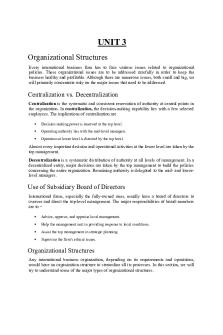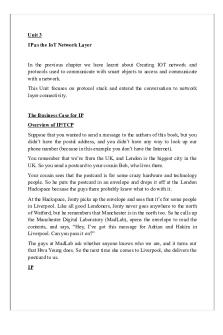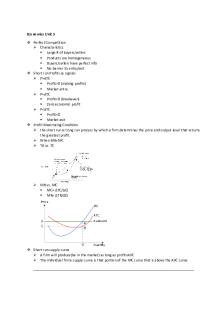Unit 3 notes - Dr. Drabinski PDF

| Title | Unit 3 notes - Dr. Drabinski |
|---|---|
| Course | Introduction to Critical Sexuality Studies |
| Institution | University of Maryland Baltimore County |
| Pages | 10 |
| File Size | 189.4 KB |
| File Type | |
| Total Downloads | 39 |
| Total Views | 156 |
Summary
Dr. Drabinski...
Description
Unit 3- Politics and the State October 25, 2017 Theoretical foundations, Rubin’s “thinking sex” What does it mean to say all sex is political? What do we say about incest/pedophilia? Why this hierarchy?
Five main ideological formations around sex: 143-internal politics and inequities of sexuality, Axium-something that we take for granted
Sex essentialism- 149-the idea that sex is a natural force that exists in social life, embedded in folk society, sex is unchanging and historical, biologically true, a property of individuals Sex negativity-150- “the most important”, sex is a destructive force, inherently sinful, treat sex with suspicion, sex is guilty until proven innocent o overwhelming need to justify sex o intersectionally- gender makes a difference o can’t let children see anything about sex o sex education historically has been negative- teaches that sex is dangerous Fallacy of the misplaced scale- “burdened with an excess of significance” o Reaction to Donald trump How does sexual taste disqualify one to be president? o Movie ratings- sex v violence, procreative v passionate sex Hierarchal valuation of sex acts-153- the “charmed circle” Inside- Ideologically positively accepted/valued, outer limits-unnormal, not accepted, socially speaking, these are things that are rewarded, these are the things that are punishable
Marriage, procreative, coupled, same age, free, monogamous, at home, vanilla, bodies only, heterosexuality, committed relationships
Unmarried sex, cross-generational sex, sex for pay, sex for pleasure, BDSM, sex in groups, pornography, toys, homosexuality, casual sex, dif. Types of sex
October 27, 2017 Constitutive outside-The thing that we refuse, constitutes the refuser as positive
You know your heterosexual because you aren’t homosexual
Domino theory of Sexual peril
Slippery slope- “if we expose kids to gay people, soon they will be turned gay”, once we allow this, it will open the floodgates Once we put something into the good, it puts the bad into more of an outer position.
Age of consent laws
16 +- 4 years Rubens argues that these laws produce children without sexuality or agency around sexuality. These laws assume that children don’t have agency. o Psychological development o Power differentials
October 30, 2017 Marriage People are proud of marriage over anything else, the right to be taken serious, the right for parents to stop asking when Social institution
Ring, social support, love, companionship, commitment, respect
Legal institution
Immigration, tax benefits, inheritance, children, separate from religion, sharing “basket of rights”
Religious institution
Tradition, make it complete or real, sign of maturity or adulthood, sanctify sexual relationships
Social rights
Citizenship rights
Property rights
Homeownership, divorce
Parental rights
Adoption rights, marriage insures rights to kids
Writer thinks these rights only apply to certain people Writer- marriage has never secured women these rights A fight for people who have these rights already Tax benefits- self, child tax credit, homeowner exemptions, healthcare exemption, marriage tax laws based on heterosexuality where a man marries a woman who makes less $$
Against same sex marriage
Gay marriage is dog marriage Morally wrong Doesn’t produce children Writer-709-we need to understand politics around marriage around politics on the welfare state o Echoes of welfare state policies o Closer examination of racial politics is important
Welfare- foster care, wic, food stamps, TANF/SNAP, Medicaid
A type of safety net for people who are falling through the cracks Representations- lazy, black “welfare queens” PRWORA- 1996- time limits on welfare, block grant programs, vouchering programs instead of direct cash grants, immigrants are banned from services for 5 years Marriage promotion programs
November 3, 2017
The New Black
Using black voters as pawns- key theme Making SSM a black issue Connecting ssm with civil rights movement o We are not done with prejudice o Radically different histories o Why focus on ssm and not anti-discrimination law? o Many arguments Tonex argument o “practice” homosexuality “if you’ve been trampled on, sometimes you have to trample others” Do some parts of the black church have the same stance after the law passed? Strange to see people vote for a legal right
November 6, 2017 Immigration and Sexuality
Push/pull theory of immigration McCaran-Walter Act of 1952
Why do people immigrate?
Better opportunities To escape disaster, tragedy, government, persecution To explore
How do you choose where to go?
Cost Language Proximity Laws of place where you are going- ease of entry Social environment/situation
*3% of the world’s population migrates to the US* Push/pull theory of migration
Push factors that push people to migrate and leave where they live- persecution, lack of jobs and natural resources, disasters, war Pull factors are things that draw someone to a country- asylum laws, job opportunities, plentiful resources, past histories of war and colonization Sending and receiving countries are connected o Resources have been extracted
Colonization- extracted for global capital
Who can immigrate to the US?
Who can be a productive citizen? o Biopower-produce life, ways of living that maximize productivity Anti sodomy laws, marriage laws, welfare laws o Racialized- based in ideas of race “Chinese built the railroads” Asian exclusion Acts- labor no longer needed Bracero program 1950s- temporary work permits o Do we need labor?
Immigration policy is mainly about getting a certain type of laborer Jobs “we” won’t do
Hard labor Doesn’t require a degree Cleaning Low pay Stigmatized work
1950s
Red scare/McCarthyism- related to homosexuality- susceptible to blackmail Segregation Reorganized gender system Fear of the spread of homosexuality, not comfortable- contagion- homosexuality becomes the constitutive outsideo I am good because you are not, they are the threat McCarran-Walter Act of 1952-2 anti-homosexual provisions to exclude homosexuals from immigrating o Exclusion based on behavior- engaged in a crime of “moral turpitude”- unspecified ACTS o Exclusion based on status- “psychopathic” personality- ambiguous- IDENTITES Psychiatric diagnosis Said that psychiatric people are not good citizens People with aids/hiv not allowed in until ~2000s o 353- relied that the homosexual was a type of persono 357- vague meaning, sexual deviant, sex perverts, being gay is a “mental illness”
November 13, 2017 Immigration
Psychiatrists become arbiters of health Single act of same sex freezes your identity as psychopathic Use stereotypes to define sexuality Stabilization of identity- ideas that identity is fluid goes away, gets fixed in the law Starts as a medical status to a legal status, becomes political Becomes a way for lgbtq people to organize P 33- recognizable group via immigration law Exclusion creates a community that strives for inclusion
Heteronormativity- heterosexuality is considered the norm, seen as natural, anything outside of it is unnatural, gender norms structure heterosexual relationships Queer- For sims, is about sexuality, but is not a fixed category of identity, one who’s sexuality and gender identity is outside of the norm. “Outsiders within” + “borderlands”- identities are on the border of many identities, ex bisexuality Bisexuals according to the state- either too gay or not gay enough
Queer Injustice
Labeling something as a crime is a social decision Mass incarceration disproportionately affects queer people “PIC is a system that promotes prisons as solutions to political and societal problems”
Prison Industrial Complex
Privatizing prisons Military industrial complex o The economy runs only because we are at war o War creates massive spending, demand for supplies, creates jobs Keynesianism- pump money into the economy, the states need to come in and boost it Prisons o You need almost the same stuff as if you start a war o Replace the former military base or factory into a prison Crime o A lot of deep social causes of murder o Prisons only work from the law breaking, not the social system that produced this issue
November 15, 2017 PIC- all the things you need making $ off incarceration, state spending to boost the economy, prison labor What do prisons do?
Remove violent people from society Rehabilitate people before they return to society Punishment- deterrence, revenge
Control social problems- war on drugs Enforce racism-system not fair House mentally ill- suggests that we can see the prison system in other parts of life-carceral logics
Crime and punishment
Power over death- historically violent punishment Public shaming- teaching other people to not do what you did Now- a way to try to produce better citizens- bio power- power over life o Incarceration will fix you Panopticon- type of prison Surveillance- control- carceral logics
Drug use
Place Kind Who is using the drug Cocaine vs crack, “white people use cocaine, black people use crack”, racialized disparate where white people would get less punishment vs black people Rates of drug use are almost identical across groups
Criminalization- how something becomes a crime, how certain identities get produced as already criminal Demands for justice get coded as criminal Loitering Archetype
Categories of things that can be unrelated Something like a stereotype, but different Connection between homosexuality and sexual predators o Trickery Transgender people as sexual predators Gender inversion Queerness is a pathology Cultural ingrained representations p.23 Vs stereotype- Archetype is a deep negative response that some people don’t even have control of, from repetitious stories, in our genes, sense of fear, hatred, don’t even notice
November 17, 2017
Historical roots o Policing gender/sexuality is part of the colonial project ex. Sodomy laws, rhetorical arguments that indigenous people were sinful/disgusting
Construction of the jezebel (sexually aggressive, manipulative, hypersexual archetype), black male rapist Archetypes o Queer killer- pg. 27- torturer, killer, “homicidal lesbians 1890s”, Norman Bates/Hannibal Lecter - because they are queer o Sexually degraded predator- queer people’s sexuality is degraded- threat to other people- pg 31- assumes that there is something sick or pathological with gay people, used to justify keeping gay people out of schools etc. o Disease spreader-pg.34- queer people are notoriously promiscuous, spreads disease, patient zero, HIV/AIDS o Queer security threat o Young queer criminal intruder- pg 40- young queer people are labeled as a dangerous threat to the community, youth are a dangerous group o Criminalize the identity, not the behavior/acts o Fed by news stories, fed by media representations, histories Survival sex- sex work in order to survive/make money Strategies of policing o Pg 48- quality of life policing-broken window theory- the police catches people for small crimes in order to prevent big crimes- noise complaints, public urination, loitering, blocking the sidewalk o Sexist police “controlling images” + prosecutions o
November 27, 2017 Hate Crime legislation
Supposed to protect minority groups from being targeted for certain crimes Sentencing enhancement Cant kill people just because they are there Doesn’t do anything/doesn’t help if they are never investigated Hard to categorize what is a hate crime 126- focus on individual actors not systemic issues o Built in systemic, rehearsed over and over issues since colonization o To decrease violence, git rid of norms 127- can contribute to violence against the groups the legislation is trying to protect o Contribute to systemic violence against those they purport to protect Doesn’t recognize how hate can operate, power differentials Increases policing that tends to increase the policing of communities of color, queer people Policing focuses on lgbtq and poc community 132- just doesn’t work o We’ve had these laws yet violence has not decreased, so why would we do it? “like Asking abuser to help protect you”
Chapter 7 Solutions
Confront policing of sex+gender o “sex in public” o Presence in public is translated as sex work o End stereotypes that queer people are sex workers o What counts as sex in public? o “De-policing sex and gender could decrease trans/queer people” o End policing of sex work altogether o Labeling something a crime is a social decision o Decriminalize survival sex Educate police so that they don’t over police groups Educate defense attorneys, judges, prosecutors More community organizing for safety outside state apparatuses
Sex work
Survival o Lack of support from family o Kicked out of the house for possibly being lgbtq Culture, exposure Need medical services o Not covered by insurance
False Promises Exam Criminal legal system- ch 7 #6 chapter one
Black and Pink
Support lgbtq prisoners Pen pal project
Fierce
Engaged in building leadership of lgbt community Fierce organizing model Focus on leaders within the community
Break out
Focuses on building the power of lgbtq poc in New Orleans
Baltimore Transgender alliance...
Similar Free PDFs

Unit 3 notes - Dr. Drabinski
- 10 Pages

Janet Mock notes - Dr. Drabinski
- 1 Pages

Unit 3 Textbook Notes
- 29 Pages

Sdm-unit 3 - notes
- 35 Pages

UE18CS313 UNIT 3 Notes
- 47 Pages

HHD UNIT 3 - notes
- 43 Pages

Unit 3 Notes
- 7 Pages

Unit-3-Notes - Lecture notes 3
- 12 Pages

Exam 3 Notes - Dr. Zaghoul/zhang
- 19 Pages

Unit 3 Study Guide - notes
- 8 Pages

ATAR Notes Unit 3 Summary
- 33 Pages

UNIT 3(VKT) lecture notes
- 15 Pages

PHYS 1000 - Unit 3 Notes
- 7 Pages

Psychology UNIT 3/4 Notes
- 115 Pages

UNIT 3 LEAN Manufacturing NOTES
- 29 Pages
Popular Institutions
- Tinajero National High School - Annex
- Politeknik Caltex Riau
- Yokohama City University
- SGT University
- University of Al-Qadisiyah
- Divine Word College of Vigan
- Techniek College Rotterdam
- Universidade de Santiago
- Universiti Teknologi MARA Cawangan Johor Kampus Pasir Gudang
- Poltekkes Kemenkes Yogyakarta
- Baguio City National High School
- Colegio san marcos
- preparatoria uno
- Centro de Bachillerato Tecnológico Industrial y de Servicios No. 107
- Dalian Maritime University
- Quang Trung Secondary School
- Colegio Tecnológico en Informática
- Corporación Regional de Educación Superior
- Grupo CEDVA
- Dar Al Uloom University
- Centro de Estudios Preuniversitarios de la Universidad Nacional de Ingeniería
- 上智大学
- Aakash International School, Nuna Majara
- San Felipe Neri Catholic School
- Kang Chiao International School - New Taipei City
- Misamis Occidental National High School
- Institución Educativa Escuela Normal Juan Ladrilleros
- Kolehiyo ng Pantukan
- Batanes State College
- Instituto Continental
- Sekolah Menengah Kejuruan Kesehatan Kaltara (Tarakan)
- Colegio de La Inmaculada Concepcion - Cebu
